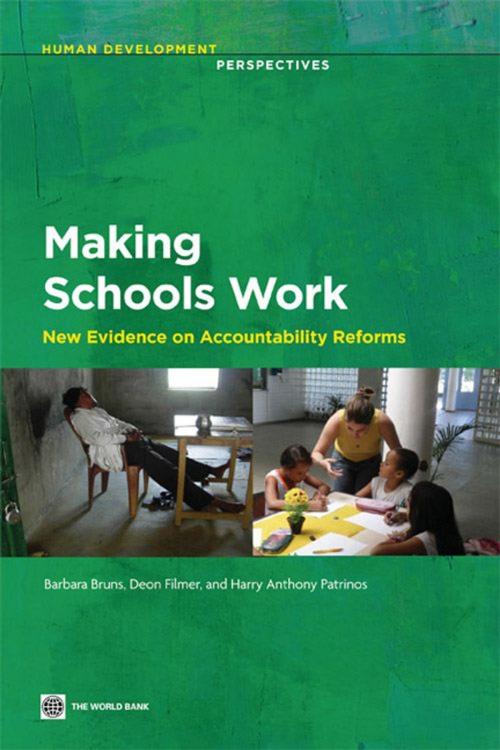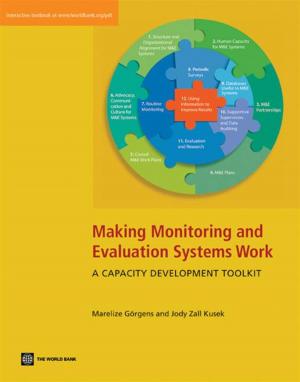Making Schools Work: New Evidence on Accountability Reforms
Nonfiction, Reference & Language, Education & Teaching, Educational Theory, Educational Reform| Author: | Bruns, Barbara; Filmer, Deon; Patrinos, Harry Anthony | ISBN: | 9780821386804 |
| Publisher: | World Bank | Publication: | February 24, 2011 |
| Imprint: | Language: | English |
| Author: | Bruns, Barbara; Filmer, Deon; Patrinos, Harry Anthony |
| ISBN: | 9780821386804 |
| Publisher: | World Bank |
| Publication: | February 24, 2011 |
| Imprint: | |
| Language: | English |
This book is about the threats to education quality in the developing world that cannot be explained by lack of resources. It reviews the observed phenomenon of service delivery failures in public education: cases where programs and policies increase the inputs to education but do not produce effective services where it counts - in schools and classrooms. It documents what we know about the extent and costs of such failures across low and middle-income countries. And it further develops the conceptual model posited in the World Development Report 2004: that a root cause of low-quality and inequitable public services - not only in education - is the weak accountability of providers to both their supervisors and clients.The central focus of the book however is a new story. It is that developing countries are increasingly adopting innovative strategies to attack these problems. Drawing on new evidence from 22 rigorous impact evaluations across 11 developing countries this book examines how three key strategies to strengthen accountability relationships in developing country school systems have affected school enrollment completion and student learning. The book reviews the motivation and global context for education reforms aimed at strengthening provider accountability. It provides the rationally and synthesizes the evidence on the impacts of three key lines of reform: (1) policies that use the power of information to strengthen the ability of clients of education services (students and their parents) to hold providers accountable for results; (2) policies that promote school-based management?that is increase schools? autonomy to make key decisions and control resources often empowering parents to play a larger role; (3) teacher incentives reforms that specifically aim at making teachers more accountable for results either by making contract tenure dependent on performance or offering performance-linked pay. The book summarizes the lessons learned draws cautious conclusions about possible complementarities across different types of accountability-focused reforms if they are implemented in tandem considers issues related to scaling up reform efforts and the political economy of reform and suggests directions for future work.
This book is about the threats to education quality in the developing world that cannot be explained by lack of resources. It reviews the observed phenomenon of service delivery failures in public education: cases where programs and policies increase the inputs to education but do not produce effective services where it counts - in schools and classrooms. It documents what we know about the extent and costs of such failures across low and middle-income countries. And it further develops the conceptual model posited in the World Development Report 2004: that a root cause of low-quality and inequitable public services - not only in education - is the weak accountability of providers to both their supervisors and clients.The central focus of the book however is a new story. It is that developing countries are increasingly adopting innovative strategies to attack these problems. Drawing on new evidence from 22 rigorous impact evaluations across 11 developing countries this book examines how three key strategies to strengthen accountability relationships in developing country school systems have affected school enrollment completion and student learning. The book reviews the motivation and global context for education reforms aimed at strengthening provider accountability. It provides the rationally and synthesizes the evidence on the impacts of three key lines of reform: (1) policies that use the power of information to strengthen the ability of clients of education services (students and their parents) to hold providers accountable for results; (2) policies that promote school-based management?that is increase schools? autonomy to make key decisions and control resources often empowering parents to play a larger role; (3) teacher incentives reforms that specifically aim at making teachers more accountable for results either by making contract tenure dependent on performance or offering performance-linked pay. The book summarizes the lessons learned draws cautious conclusions about possible complementarities across different types of accountability-focused reforms if they are implemented in tandem considers issues related to scaling up reform efforts and the political economy of reform and suggests directions for future work.















